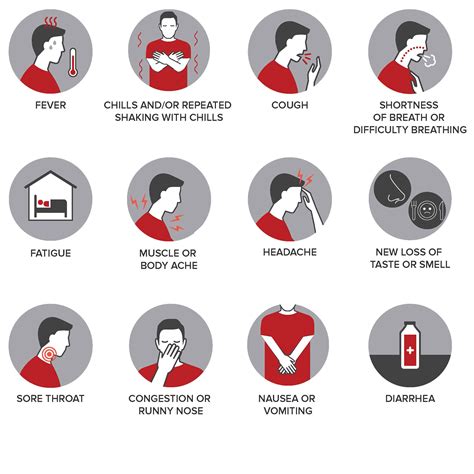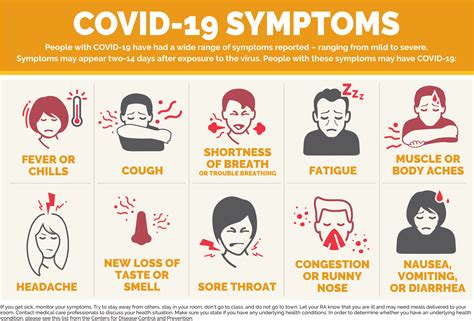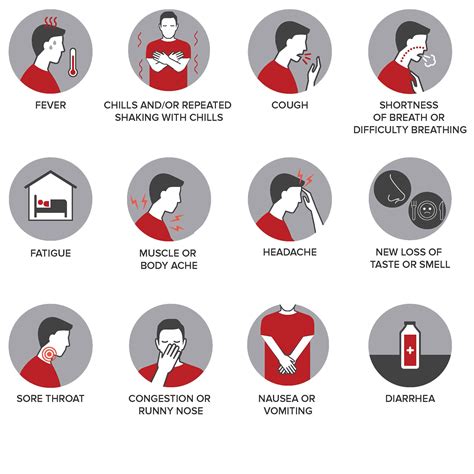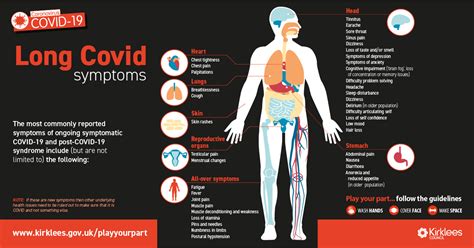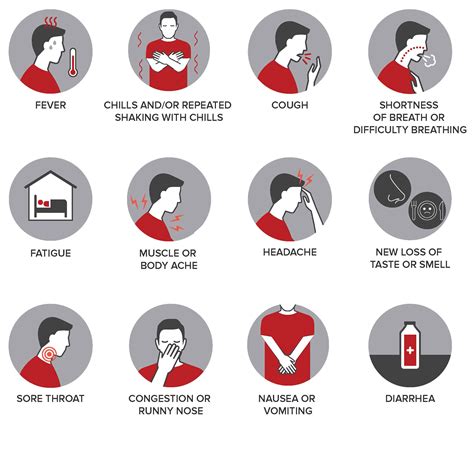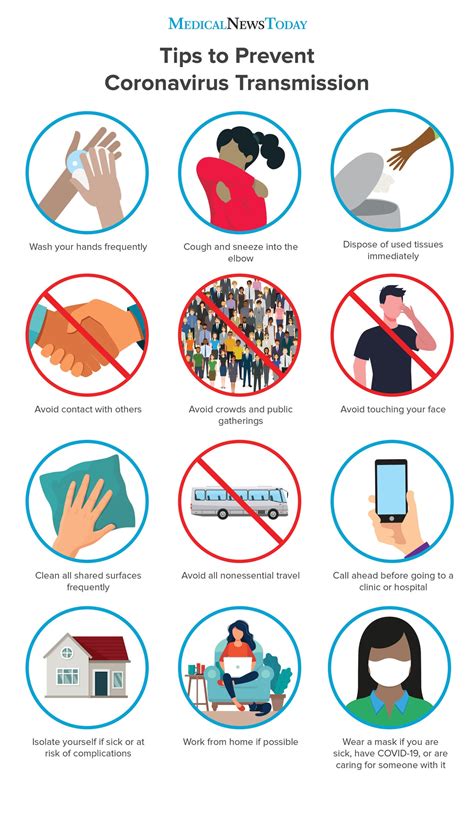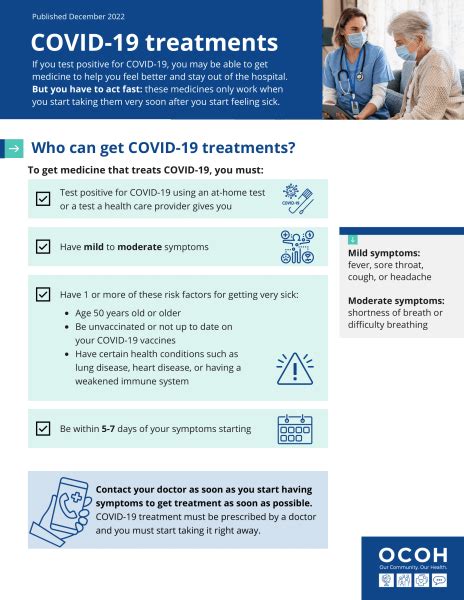The COVID-19 pandemic has been a significant global health concern for several years, and understanding its symptoms is crucial for early detection, treatment, and prevention of the spread of the virus. COVID-19, caused by the SARS-CoV-2 virus, can manifest in a wide range of symptoms, from mild to severe. Recognizing these symptoms can help individuals seek medical attention promptly, reducing the risk of complications and transmission to others.
The importance of identifying COVID-19 symptoms cannot be overstated. Early recognition allows for timely intervention, which can significantly improve outcomes. Furthermore, awareness of the symptoms helps in adhering to public health guidelines, such as isolation and vaccination, which are critical in controlling the spread of the virus. As the virus continues to evolve, staying informed about its symptoms is essential for both personal and public health.
The symptoms of COVID-19 can vary widely among individuals, with some experiencing mild symptoms similar to a common cold, while others may have severe symptoms requiring hospitalization. Factors such as age, underlying health conditions, and the presence of comorbidities can influence the severity of the symptoms. Understanding the common symptoms of COVID-19 is the first step in managing the disease and preventing its spread.
Introduction to Covid Symptoms
The COVID-19 symptoms can be categorized into mild, moderate, and severe. Mild symptoms may include fever, cough, and fatigue, which can be managed at home with rest, hydration, and over-the-counter medications. Moderate symptoms, such as shortness of breath and chest pain, may require medical attention to prevent progression to severe disease. Severe symptoms, including difficulty breathing, persistent chest pain, and confusion, are medical emergencies that require immediate hospitalization.
Common Covid Symptoms
Common COVID-19 symptoms include:
- Fever: This is one of the most common symptoms, indicating that the body is fighting an infection.
- Cough: A dry cough is typical, but some people may produce mucus.
- Fatigue: Feeling extremely tired is a prevalent symptom, affecting daily activities.
- Shortness of breath: Difficulty breathing or feeling winded even when sitting still or doing very little.
- Muscle or body aches: Painful muscles and joints are common, similar to what is experienced with the flu.
- Headache: A headache can range from mild to severe and is often accompanied by other symptoms.
- Sore throat: Irritation and pain in the throat can make swallowing uncomfortable.
- Runny nose: Or stuffy nose, similar to symptoms of a common cold.
- Diarrhea: Some individuals may experience gastrointestinal symptoms, including diarrhea.
- Nausea or vomiting: Stomach upset can lead to nausea and vomiting, though these are less common.
Less Common Covid Symptoms
Less common symptoms of COVID-19 can include:
- Skin rashes or lesions
- Conjunctivitis (pink eye)
- Loss of appetite
- Confusion
- Chest pain or pressure
- Loss of speech or movement
Emergency Covid Symptoms
Emergency symptoms that require immediate medical attention include:
- Difficulty breathing
- Persistent pain or pressure in the chest
- Severe headache
- Confusion or inability to wake up
- Bluish lips or face
Long-Term Covid Symptoms
Some individuals may experience long-term symptoms after recovering from COVID-19, known as post-acute COVID-19 or "long COVID." These can include:
- Persistent fatigue
- Muscle pain
- Joint pain
- Chest pain
- Shortness of breath
- Cognitive difficulties
- Depression and anxiety
Managing Covid Symptoms
Managing COVID-19 symptoms involves a combination of self-care, over-the-counter medications, and, in some cases, prescription medications. Rest, staying hydrated, and using a humidifier can help alleviate symptoms. Over-the-counter medications such as acetaminophen (Tylenol) or ibuprofen (Advil, Motrin) can help reduce fever and relieve headaches and muscle aches. It is crucial to follow the recommended dosage and consult with a healthcare provider before taking any medication, especially for individuals with underlying health conditions.
Preventing Covid Transmission
Preventing the transmission of COVID-19 is key to controlling the pandemic. Measures include:
- Vaccination: Getting vaccinated against COVID-19 significantly reduces the risk of infection and severe disease.
- Masking: Wearing masks in public places, especially in areas with high transmission rates, can reduce the spread of the virus.
- Social distancing: Maintaining at least 6 feet of distance from others can prevent close contact and reduce transmission.
- Hand hygiene: Frequent washing of hands with soap and water or using hand sanitizer can kill the virus on the skin.
- Avoiding crowds: Reducing exposure to crowded areas can minimize the risk of coming into contact with infected individuals.
Covid Treatment and Care
Treatment for COVID-19 depends on the severity of symptoms. Mild cases can be managed at home with supportive care, while moderate to severe cases may require hospitalization. Antiviral medications, such as remdesivir, may be prescribed to reduce the severity and duration of symptoms. In severe cases, oxygen therapy, mechanical ventilation, and other supportive care may be necessary.
Future Directions in Covid Research
Ongoing research into COVID-19 focuses on understanding the virus's evolution, developing more effective treatments, and improving vaccination strategies. Studying the long-term effects of COVID-19 and the impact of vaccination on different populations are also key areas of research. As the pandemic continues to evolve, staying updated with the latest scientific findings and public health guidelines is crucial for managing the disease and preventing its spread.
In conclusion, understanding the symptoms of COVID-19 is essential for early detection, treatment, and prevention of the spread of the virus. By recognizing the common and less common symptoms, individuals can seek medical attention promptly, reducing the risk of complications and transmission to others. As research continues to uncover more about the virus, adhering to public health guidelines and staying informed will remain critical in the fight against COVID-19.
What are the most common symptoms of COVID-19?
+
The most common symptoms include fever, cough, fatigue, shortness of breath, and muscle or body aches.
How can I prevent the transmission of COVID-19?
+
Prevention measures include vaccination, wearing masks, social distancing, hand hygiene, and avoiding crowds.
What should I do if I experience emergency COVID-19 symptoms?
+
If you experience difficulty breathing, persistent pain or pressure in the chest, severe headache, confusion, or inability to wake up, seek immediate medical attention.
Can COVID-19 symptoms last long after recovery?
+
Yes, some individuals may experience long-term symptoms after recovering from COVID-19, known as post-acute COVID-19 or "long COVID," which can include persistent fatigue, muscle pain, and cognitive difficulties.
How can I manage COVID-19 symptoms at home?
+
Managing symptoms at home involves rest, staying hydrated, using a humidifier, and taking over-the-counter medications as recommended by a healthcare provider.
We hope this comprehensive guide to COVID-19 symptoms has been informative and helpful. If you have any further questions or concerns, please do not hesitate to reach out. Sharing this article with others can help spread awareness and promote public health. Together, we can work towards a healthier and safer community.
